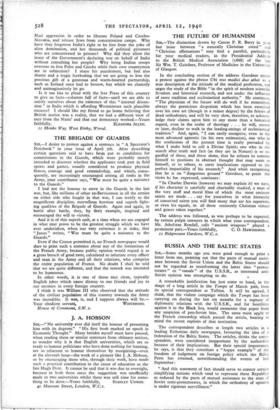THE FUTURE OF HUMANISM
Sm,—The distinction drawn by Canon F. R. Barry in Your last issue between "a naturally Christian creed" and "Christian affirmations" may find a parallel, particularly for your medical readers, in the Presidential Address to the British Medical Association (1888) of the late Sir Wm. T. Gairdner, Professor of Medicine in the University of Glasgow.
In the concluding section of the address Gairdner enters a protest against the phrase Ubi fres medici duo athei as a true description of the attitude of the medical profession, and urges the study of the Bible "in the spirit of modern scientific freedom and historical research, and not under the influence of mere tradition and ecclesiastical authority." He continues, "The physician of the future will do well if he remembers always the pernicious despotism which has been exercised over his own art (though in a minor degree) by the fetters of dead orthodoxies, and will be very slow, therefore, to acknow- ledge their claims upon him to any more than a historical regard, even in the realm of theology . . . he will, sooner or later, decline to walk in the leading-strings of ecclesiastical tradition." And, again, "I can easily recognise, even in the most advanced agnostic (in his own estimation), one who in the confusions of the present time is really pervaded by what I make bold to call a Divine Spirit; one who in the search after truth and fact (as they are in Nature) is so re- gardful of these, and these alone, that he refuses to commit himself to positions in abstract thought that may seem to himself, or to others, to carry implications opposed to the perfect impartiality of his research." And while recognising that he is on "dangerous ground" Gairdner, to point the views 11:e. has expressed, continues:
"In Charles Darwin (however we may explain it) we have, if his character is carefully and charitably studied, a man of the very stuff and moral fibre of which the most eminent saints are made . . . say for yourselves in what hierarchy of canonised saints you will find many that are his superiors, or even his equals, in all these eminently Christian virtues and graces taken together."
The address was followed, as was perhaps to be expected, by certain pulpit censures in which what your correspondent, Mr. Athelstan Rendall, calls "ancient weapons" played a


































 Previous page
Previous page